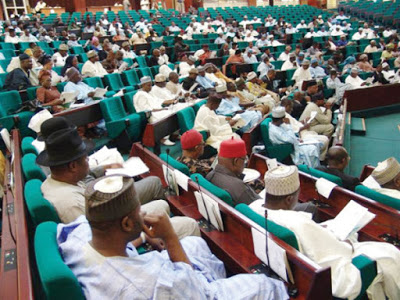
The House of
Representatives is the second chamber in Nigeria’s bicameral legislature, the
National Assembly. The National Assembly (NASS) is the nation’s highest
legislature, whose power to make laws is summarized in chapter one, section
four of the 1999 Nigerian Constitution.
Representatives is the second chamber in Nigeria’s bicameral legislature, the
National Assembly. The National Assembly (NASS) is the nation’s highest
legislature, whose power to make laws is summarized in chapter one, section
four of the 1999 Nigerian Constitution.
Sections 47-49 of the 1999
Constitution state inter alia that “There shall be a National Assembly
(NASS) for the federation which shall consist of two chambers: the Senate and
the House of Representatives”.
Constitution state inter alia that “There shall be a National Assembly
(NASS) for the federation which shall consist of two chambers: the Senate and
the House of Representatives”.
The House of
Representatives is headed by the Speaker assisted by the Deputy Speaker. These
Presiding officers serve as political heads. There are three hundred and sixty
(360) members in the House of Representatives representing the 360 Federal
Constituencies the country is divided into based on population.
Representatives is headed by the Speaker assisted by the Deputy Speaker. These
Presiding officers serve as political heads. There are three hundred and sixty
(360) members in the House of Representatives representing the 360 Federal
Constituencies the country is divided into based on population.
The Constitution has
vested in the House of Representatives the power to make laws for the peace,
order and good governance of the Federation.
vested in the House of Representatives the power to make laws for the peace,
order and good governance of the Federation.
The House of
Representatives also has broad oversight functions and is therefore empowered
to establish committees of its members to scrutinize bills and the conduct of
government institutions and officials.
Representatives also has broad oversight functions and is therefore empowered
to establish committees of its members to scrutinize bills and the conduct of
government institutions and officials.
The House of
Representatives is also empowered by the Constitution to legislate on
Exclusive, Concurrent and Residual lists.
Representatives is also empowered by the Constitution to legislate on
Exclusive, Concurrent and Residual lists.
Photo Credit- google.com
